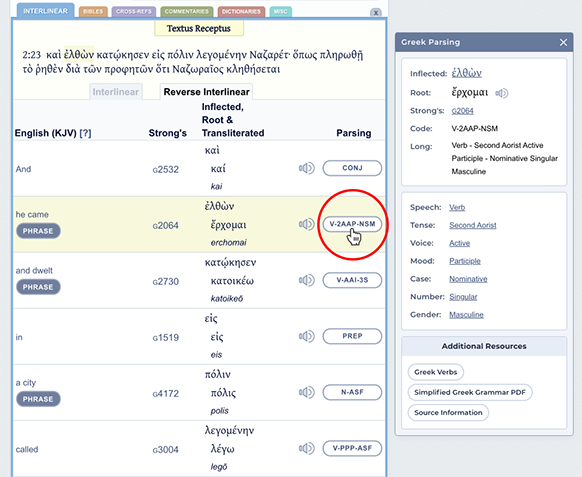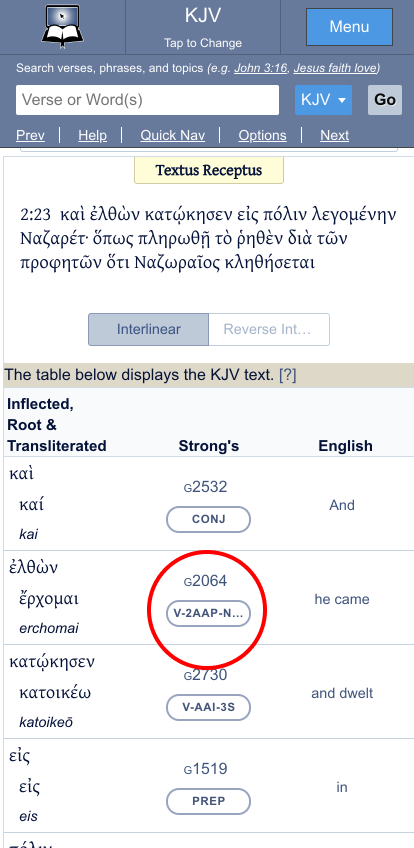
When accessing information about verbs throughout our New Testament concordance, you'll find numerous references to Greek verb tenses, their voice, and their mood. The following list identifies each verb tense and its part in speech via a comparative example in English using the the verb "to loose."
To access the verb's tense, voice, and mood, press the parsing button next to the word that you are interested in:


Before discussing tense, voice, and mood, it is first necessary to have an understanding of person and number.
Person: This is what determines whether the subject is the speaker (first person), is being spoken to (second person) or being spoken about (third person).
Number: This is what determines whether a verb is singular or plural.
| Number | |||
| Singular | Plural | ||
| Person | First | I | We |
| Second | You | Y'all | |
| Third | He, She, it | They | |
Tense plays a very crucial role in the study of New Testament exegesis. Dana and Mantey understood its significance in saying that "no element of the Greek language is of more importance to the student of the New Testament than the matter of tense". [1] Tense deals both with time and kind of action. Ancient Greek focused more on the latter of these aspects (that is, kind of action); however, time does play a role in verb tense when the mood is indicative (the four moods are explained below).
The aspect of a verb correlates with the kind of action. It determines whether the verb's action is punctiliar, linear or perfected. These are described in the following table.
| Punctiliar: |  |
action that relates to a specific point in time |
| Linear: |  |
action that is in the progress of occuring |
| Perfected: |  |
action that is both punctiliar and linear in that it refers to action relating to a point in time, yet has results that are in the progress of occuring |
The present tense can either be continuous/ongoing or undefined. The continuous present is usually translated as "I am loosing" while the undefined is best translated as "I loosen." When the present is used with the indicative mood it denotes present time.
| Example: Rev 3:20 |
 |
| Behold, I stand at the door and knock |
The action of the imperfect tense is very similar to that of the present tense. It represents continuous or reoccuring action in the past time (when used with the indicative). This is best translated as "I was loosing."
| Example: Mar 4:33 |
 |
| And with many such parables He was speaking the word to them |
This tense is hardly a tense at all. It describes indefinite or undefined action. The word aoristos derives from an alpha privative (ie. negation) and the verb horizô (meaning "to bound") thus meaning "without boundaries". [2] With the indicative mood it is often best translated as a simple past: "I loosed."
| Example: Jhn 3:16 |
 |
| For God so loved the world |
This tense generally denotes action that will occur in the future. This is best translated as "I will loose."
| Example: 1Cr 6:3 |
 |
| Do you not know that we will judge angels? |
Action that has been completed in the past yet has results occurring in the present are expressed by the perfect tense. The perfect is often translated as "I have loosened."
| Example: Jhn 19:22 |
 |
| Pilate answered, "That which I have written, I have written." |
The pluperfect has the same aspect as the perfect, yet it's time is farther removed into the past than that of the perfect. Both the completed action and the results of that action occur in the past. It also represents action that is complete and viewed from a point in the past time. [3] The usual translation for the pluperfect is "I had loosened."
| Example: Mar 15:46 |
 |
| In a tomb which had been hewn out of the rock |
Biblical Greek has three voices, active, middle, and passive:
The Active Voice:This occurs when the action of the verb is being performed by the subject.
The Middle Voice:When the subject of the verb does action unto itself, or for its own benefit, the middle voice is used.
The Passive Voice:The passive represents the action of the verb being done unto the subject but not by the subject.
There are four moods in Greek. They demonstrate the relationship between the action of the verb and reality. They denote whether the action is factual, potential, wishful, or a command.
The Indicative Mood:This is the mood of assertion or presentation of certainty. [4] The indicative mood is the only one to give designation concerning time (past, present, and future). The majority of all verbs used in the New Testament occur in the indicative mood.
The Subjunctive Mood:This is the mood of probability or desirability. It, however, has many usages and this is only a general definition.
The Optative Mood:The optative has relatively few appearences in the New Testament because—by the time the New Testament was written—the subjunctive has taken over some of the classical usages of it. Some of its usages include, a wish/prayer or a potential statement. Mounce states that the optative is two steps away from reality whereas the subjunctive is only one step away. [5]
The Imperative Mood:This mood is reserved for the indication of commands.
An infinitive is a verbal noun. Neither person nor number are found in the infinitive and it does not have mood designation. It is best translated, "to loose."
For additional information regarding Greek verbs and other grammatical issues the following books should be of great value:
Beginning Students
Advanced Students
[1] H. E. Dana and Julius R. Mantey. A Manual Grammar of the Greek New Testament. New York: The Macmillan Company, 1927. p. 176
[2] Stephen W. Paine. Beginning Greek: A Functional Approach. New York: Oxford UP, 1961. p. 41
[3] H. E. Dana and Julius R. Mantey. A Manual Grammar of the Greek New Testament. New York: The Macmillan Company, 1927. p. 178
[4] See Daniel B. Wallace. Greek Grammar Beyond the Basics. Grand Rapids: Zondervan Publishing House, 1996. p. 448
[5] William D. Mounce. Basics of Biblical Greek. Grand Rapids: Zondervan Publishing House, 1993. p. 325
The Blue Letter Bible ministry and the BLB Institute hold to the historical, conservative Christian faith, which includes a firm belief in the inerrancy of Scripture. Since the text and audio content provided by BLB represent a range of evangelical traditions, all of the ideas and principles conveyed in the resource materials are not necessarily affirmed, in total, by this ministry.
Loading
Loading
| Interlinear |
| Bibles |
| Cross-Refs |
| Commentaries |
| Dictionaries |
| Miscellaneous |
